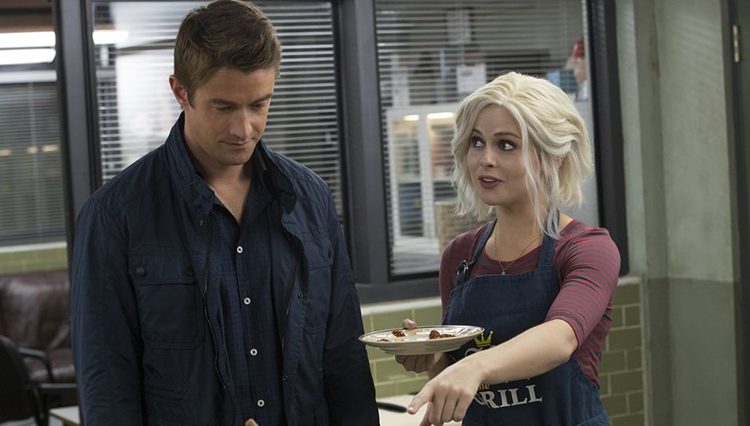“To begin your study of the life of Muad’Dib, then, take care that you first place him in his time: born in the 57th year of the Padishah Emperor, Shaddam IV. And take the most special care that you locate Muad’Dib in his place: the planet Arrakis. Do not be deceived by the fact that he was born on Caladan and lived his first fifteen years there. Arrakis, the planet known as Dune, is forever his place.”
“Dreams make good stories, but everything important happens when we’re awake.”
Dune, 2021 (Timothée Chalamet, Zendaya) Legendary Pictures/Warner Bros.
Joseph Campbell wrote of the hero’s journey. If we have a hero, then we have to start at a place when the hero was not a hero. He was a boy. She was a girl. Paul Atreides represents two components of power. He is the boy-king, heir to the Dukedom in the House of Atreides; a very important person. He is also the “messiah” figure, the Muad’Dib of Arrakis, sentinel of the Fremen. In the Campbell parlance, the hero must overcome great obstacles, gather his wits, and finally learn. He may fall on his face a hundred times, but in the communication between character and audience, the audience must see themselves in the boy-king or god-messiah.
Atreides’ curse is that he is to become the messiah. It’s not a gift. In the book, his father, Leto (Oscar Isaac) foresaw the misfortune that would befall his son and his concubine, the mother of his child, Lady Jessica (Rebecca Ferguson). He saw it because he was also prophesied to be Muad’Dib, which was why he accepted the Emperor’s decision to move his House to Arrakis in order to oversee spice manufacture in the wake of the House Harkonnen’s departure. Leto either believes he will be killed, or that he will unite the Fremen in the common cause of defeating the Emperor and his thugs.
The Spice (known as “Melange” in the book) is the catalyst, and cultural touchstone to which Herbert tethers his story. Dune, even classified as science fiction or “Imaginative Literature,” stands more as a liturgical analysis of the modern world and culture. With a bloated empire running (or ruining) the galaxy and Houses of Dukes in the Universe, the book examines the concepts of Imperialism and Colonialism, as well as the unsettling mixture of religion with empire, personified by the Reverend Mother (Charlotte Rampling), the leader of the Bene Gesserit; nun-like figures who manifest telepathic powers and reside deep within the pockets of the Princopate, providing influence and favors in exchange for their support (much like the Vatican and the early days of the Holy Roman Empire).

The Spice serves as a analogue for oil, a most precious resource that serves a multitude of functions, although the 2021 remake, interestingly, underscores its viability as a drug and hallucinogen more than anything else. In the books (and the 1984 film), the Spice is used in everything from food to fuel to clothing. Dune was an early example of “world-building,” owing to details of densely-packed historical and cultural fiction.
This was exciting writing for its time, but with Denis Villeneuve’s adaptation, the words don’t leap off the page so much as they drip like heavy syrup. The movie is a muddled masterpiece that wants to tell a story with beautiful images, but is forced to resort to clunky exposition and bizarre prose (and I’m not talking “bizarre” in the David Lynch sense). Characters will enter into scenes, utter nonsensical dialogue, and then retreat into shadows. The slow pace and editing short-change what could have been an incredible film. In fact, Villeneuve is so in love with his images, he probably should have made Dune (and his earlier Blade Runner: 2049) as a silent film. I’m serious.
We really don’t need half the dialogue we get, and most of it is expository anyway; in service to the story and rarely used in characterization, except for Zendaya’s cameo as, I’m assuming, Chani (though she’s never identified as such). She gets star billing for what is essentially five minutes of screen time as a series of “Lynchian cutaways.” Villeneuve chooses to make Chani the narrative bookend of this first half (more like three-quarters) of the first book. Zendaya, while very easy on the eyes, lacks the charisma and personality to keep our attention for two-and-a-half hours. I had the same problem with her when I reviewed Malcolm & Marie earlier in the year.
Timothée Chalamet has an interesting problem. While remaining faithful to the book by casting a very young-looking man as Paul Atreides (though he and Kyle MacLachlan were the same age), the transition from boy to man is nonexistent. The same argument can be made for Zendaya by way of Sean Young. Even though they’re the same age as their predecessors, these kids look and talk like kids. Passion is scarce in this movie. Perhaps the producers were hoping Chalamet would bulk up and age a little before getting into some of the more adult aspects of the story, but like I said, this first movie covers three-quarters of the book by itself, so it’s anybody guess what the second part will encompass.
This new version of Dune would’ve presented the filmmakers with a golden opportunity to cast unknowns because it seems the entire cast is buried under pounds of dirt, sand, latex, and costumery. It took me two hours to recognize Javier Bardem in the crucial role of Stilgar, erstwhile leader of the Fremen. Like the 1984 movie, the cast is wasted, and also like Lynch’s version, the same narrative beats are followed but with a frequently slower pace. Every scene in this movie is at least twice as long as it should be. Add to this the wailing, atonal Hans Zimmer score (which sounds like something Christopher Nolan threw away for being too obscure) and Dune can easily become a frustrating experience for fans of the book.
Unfortunately, the message is lost in all adaptations of Dune. The books were a warning, contained within the pages of the first book: “Power attracts the corruptible.” It isn’t spoiling anything to tease what will eventually happen to Paul as he ascends to power. He becomes everything he was taught to hate, but in this day and age when we crave heroic mythology, gurus, and messiahs, we’ve become blind to the danger of sycophancy and the tightening grip of the cult.
“When I am Weaker than You, I ask you for Freedom because that is according to your principles; when I am Stronger than you, I take away your Freedom Because that is according to my principles.”
― Frank Herbert, Children of Dune







